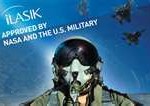LASIK for Pilots (and Astronauts)
Submitted by Dr. Dean Dornic on Sun 09/23/2012 - 12:49

Thanks to advanced LASIK, many more now are pilot candidates.
Used to be if you weren’t blessed with naturally good vision, you were disqualified from becoming an airforce pilot or astronaut. Thanks to LASIK eye surgery and some of the newer innovations in vision correction surgery, all of that has changed. After years of study, the Air Force has decided to change their long-standing policy which disqualified applicants who have had LASIK surgery from flight training and navigator training. Prior to the change, officers who had had the surgery, prior to flight school could not become Air Force aviators. Under the old policy, a select-few pilots and navigators who had already graduated from flight training could apply to have the surgery and become part of an on-going study group. The change also removes the altitude and high-performance aircraft restrictions for people who have had LASIK.
The results of the study are in, and the Air Force found that there was little to no effect on LASIK-treated eyes when subjected to high G-forces of combat fighter aircraft, the wind blast experienced during aircraft ejection, or exposure to high altitude.
Due to stresses placed on the eyes during flight combined with the active lifestyle of military members, the recommended refractive surgeries are Wave Front Guided Photorefractive Keratectomy, or WFG-PRK, and Wave Front Guided Laser In-Situ Keratomileusis, know as WFG-LASIK, using the femtosecond laser (IntraLase). The eyes are more trauma resistant after surgery using one of these methods compared to other forms of refractive surgeries.
Shortly after the Airforce and Navy removed the LASIK restriction for fighter pilots, NASA followed suit in allowing LASIK for astronauts. Prior to the removal of these restrictions, poor vision was one of the most common causes for disqualification of aviator candidates. Now thanks to LASIK eye surgery, the future is looking a lot brighter for those who want to reach for the stars. Of course, as with any surgery, there are no guarantees and individuals interested in an aviation career must still meet the vision standards dictated by the armed forces.
